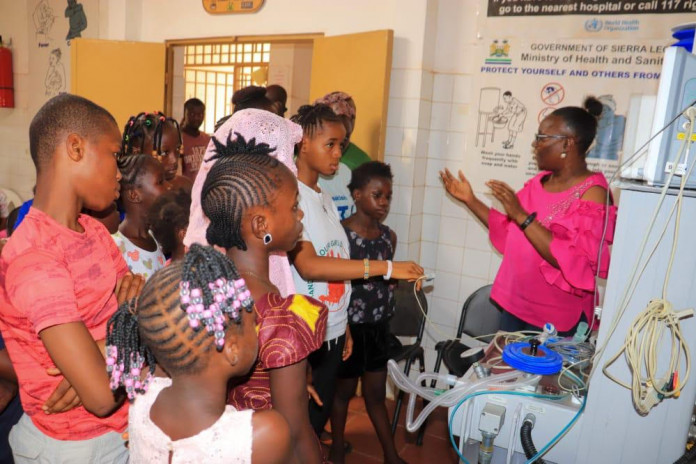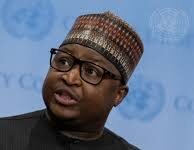By Millicent Senava Mannah
In a major humanitarian initiative, the Healey International Relief Foundation (HIRF), with support from the U.S. Government, USAID, ASHA, American schools and hospitals, has provided eight anesthesia machines valued at $240,000 to five hospitals in remote areas of Sierra Leone. These life-saving machines are set to improve healthcare delivery in facilities lacking basic infrastructure such as electricity.
As part of this larger effort, HIRF, in partnership with Caritas Freetown, organized a youth empowerment program under the “Innovate Your Future Project” (IYFP), designed to inspire students, especially young girls, to pursue careers in science and innovation. The training took place on Friday, October 11, 2024, at Jefferson Baptist School in Kissi Town, Waterloo, in the Western Rural Area.
The “Innovate Your Future Project” aims to reach at-risk youth in Sierra Leone by demonstrating how teamwork, science and innovation can address the country’s pressing economic and healthcare challenges. According to Ishmeal Alfred Charles, the In-Country Manager for HIRF, the project is supported by USAID and the ASHA program and it seeks to integrate both American and Sierra Leonean values in young people.
“We conducted a baseline survey in several locations including Waterloo, Makeni, Kamakwie, Panguma and Lunsar,” Ishmeal Alfred Charles explained. “The survey showed a lack of awareness about American support and access to advanced medical equipment, which drove us to increase interest in STEM (Science, Technology, Engineering and Mathematics), particularly among girls,” he underscored.
The donation of eight universal anesthesia machines targets hospitals in underserved areas like Christ the King Hospital in Waterloo, Holy Spirit Hospital, Panguma Hospital, Kamakwie Wesleyan Hospital and St. John of God Hospital in Lunsar. These machines, which operate independently with vaporizers, oxygen, anesthetics and inbuilt batteries providing 5 to 8 hours of power, are expected to revolutionize surgical procedures in regions with limited resources.
“The machines are designed to enhance surgical capabilities and reduce the need for external funding for patients,” Ishmeal Alfred Charles noted, adding that local training for repairs and maintenance is being provided, with a vendor identified to support the machines’ upkeep. Additionally, hospital staff including anesthetists, doctors and nurses have been trained on proper usage, minimizing the risk of breakdowns.
To ensure long-term functionality, HIRF brings biomedical technicians annually to service the machines, a practice already in place at Connaught Hospital.
In addition to healthcare support, the “Innovate Your Future Project” is focused on empowering young girls to overcome societal barriers in pursuing careers in STEM fields.
Executive Director of the Healey Foundation, Josephine Garnem, encouraged girls to challenge themselves, emphasizing that young people, particularly girls, should not shy away from math and science.
“You don’t have to be afraid of math; with practice, you can excel,” Garnem told the students. “Don’t let stereotypes about gender dictate what profession you pursue.”
Dr. Bernadette Sanko Kamara, President of Berny’s Hope Foundation, also spoke to the students, stressing that while education is important, attitude plays a critical role in how one is perceived. “Being a woman does not diminish the value of your title or your contributions,” she remarked.
Dr. Alexis Laccarino, a Board member of the Healey Foundation and a mother of three, served as an example of balancing professional and personal roles. “You can be anything you want to be; whether you’re a wife, mother or doctor. These roles do not limit your potential,” she said.
During the event, students received gifts including backpacks, pencils and books, and participated in group activities such as a robotics workshop. A similar training session had been conducted earlier at St. Joseph’s Convent in Makeni.
This initiative by HIRF and its partners represents a dual effort to both enhance healthcare delivery in remote regions and inspire the next generation of Sierra Leoneans to pursue STEM-related careers, with a particular focus on empowering young girls.




